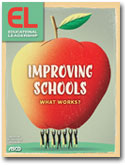What can I do to motivate teachers when theyfeel beaten down each day?" a principalasked me. This is an important questionbecause teachers who feel beaten down aren'tlikely to be effective. Teachers should be enthusiasticabout confronting challenges and eager tofind solutions. How can we create that mind-set?
I wondered what others are doing, so I askedfor input from colleagues around the UnitedStates. The questiontouched a nerve, and myin-box quickly filled. U.S.teachers often feel underappreciated.Kathleen, aneducation professor, said,
Teachers feel beatendown when they hearunwarrantedcriticismsfrom so many outside ofthe classroom setting. …Like ER doctors and nurses,cops, EMTs, and other firstresponders who see traumaand its effects on a dailybasis, teachers need to havean esprit de corps amongthemselves, and they need to be reminded of theimportance of their daily work.
Anyone who runs a school needs to considerhow we can support our teachers when they feeldiscouraged.
First, we must take the time to know ourteachers. Several people stated how importantit is for principals to visit classrooms. David, aprincipal, recommended that leaders "listen toteachers, even if there's no clear solution to theirissues. Let them know that you hear them andunderstand, are working to do what you can, andtake whatever you can off their plates (parentissues, disciplinary problems)." Sometimes themost powerful thing we can do is to listen soteachers know we understand their feelings.
Second, we must offer pats on the back for thegreat things teachers do. Another school leader, Roy, said, "I try to meet with teachers individuallyand let them know how important the job theyare doing is." At every faculty meeting, Roy triesto celebrate something, and his newsletters andpress releases highlight the positive. Too often, we(me included) focus so hard on what we still needto do that we overlook the progress that's alreadybeen made. Remember the 5:1 rule, and give fivepositive comments for each negative one or eachhard question.
Carly, a middle schooladministrator, said, "Visitthe classroom and write anote about the ‘wows andwonders' you observedand perhaps a note abouthow grateful you are forthis teacher." When I washonored at an event atNew City School recently,I saw the value of thesekinds of notes firsthand.Two teachers who taughtat the school more than adecade ago brought stacks of appreciative notes Ihad given them and told me how meaningful theywere. I was stunned they had kept the notes!
And don't limit your praise to private notes.Poppy exhorted fellow leaders to "say the words.You probably do value your teachers and respectthe work they do, but do you ever tell them specificallyand publicly? Do you ever tell your schoolboard members about the great things those individualsdo in their classrooms every day?"
The best praise is specific. "When an administratorhas been in my classroom, seen my hardwork, and then praised me for what I'm doing, Ifeel much better about that feedback than I doabout a generic ‘good job' or ‘thanks for yourhard work,'" noted Sarah. Formalizing praise isvaluable, too. "Schools must invest in recognitioninitiatives to celebrate the effort and accomplishmentsof the teachers," said Megan, a teacher.
What about routinely highlightingsuccesses at faculty meetings?
Third, beyond knowing our teachersand praising them for both their effortsand their successes, we must be surethat our schools are places whereteachers can learn with and from oneanother in a supportive way. Thisworks against teacher isolation andbenefits students. Chris, a teacher,observed that teachers have the samehierarchy of needs as students andthat we need to be sure that teachersfeel safe and supported. Once thatfeeling is in place, we can buoy spiritsand increase effectivenessby establishingprofessional inquiry groupswhere teachers can talk honestly andcollaborate.
Part of an administrator's job is tokeep everyone focused on the whybehind their efforts. One administrator,Tom, told me that often "we get so caught up in goals that we loseour mission." Kathleen returns to thatmission each week: "Our faculty andstaff have found it helpful to regroupevery Friday, meeting for about 15minutes, to talk about our days, setgoals for ourselves, and redefine ourmission and vision for our school."
My earlier use of "mind-set" wasintentional. Carol Dweck has shownus that students learn more when theysee that growth is possible, that effortmatters, and that they should takerisks in learning. The same is true forteachers. We must let teachers knowthat they can make a difference instudents' lives and that their effortsare appreciated. We do that not onlyby applauding their efforts but also bysharing power. As Doug explained,"The more decision-making authorityI gave my teachers, the more investedthey were. As the year progressed and during stressful times, they were moreaccepting of challenges and able tostay invested."
Finally, we need to create opportunitiesto relax and laugh together.This year, I'm offering six after-schooljuggling lessons for our faculty, freeof charge. I don't anticipate anyonerunning away to join the circus, but Ido expect that we'll have fun together.
What kinds of support do you giveyour teachers?

